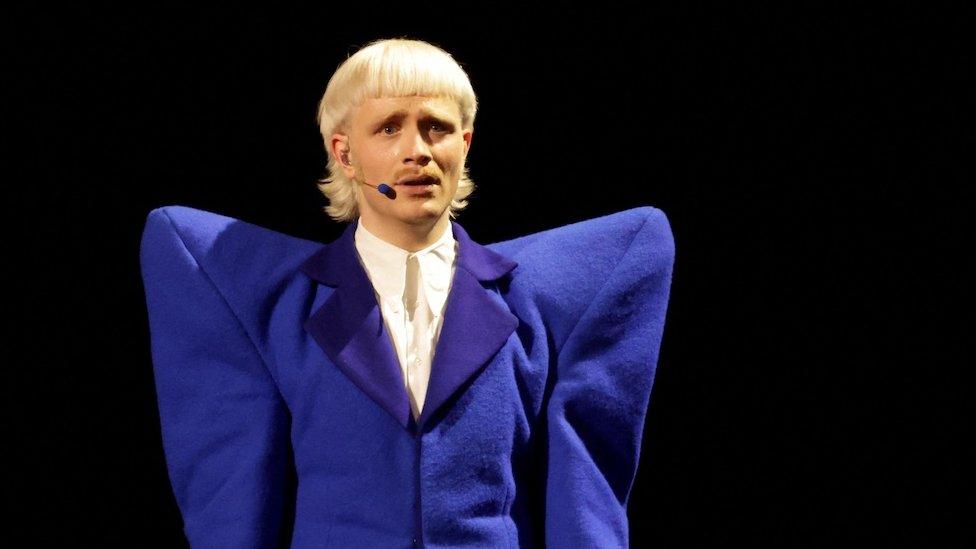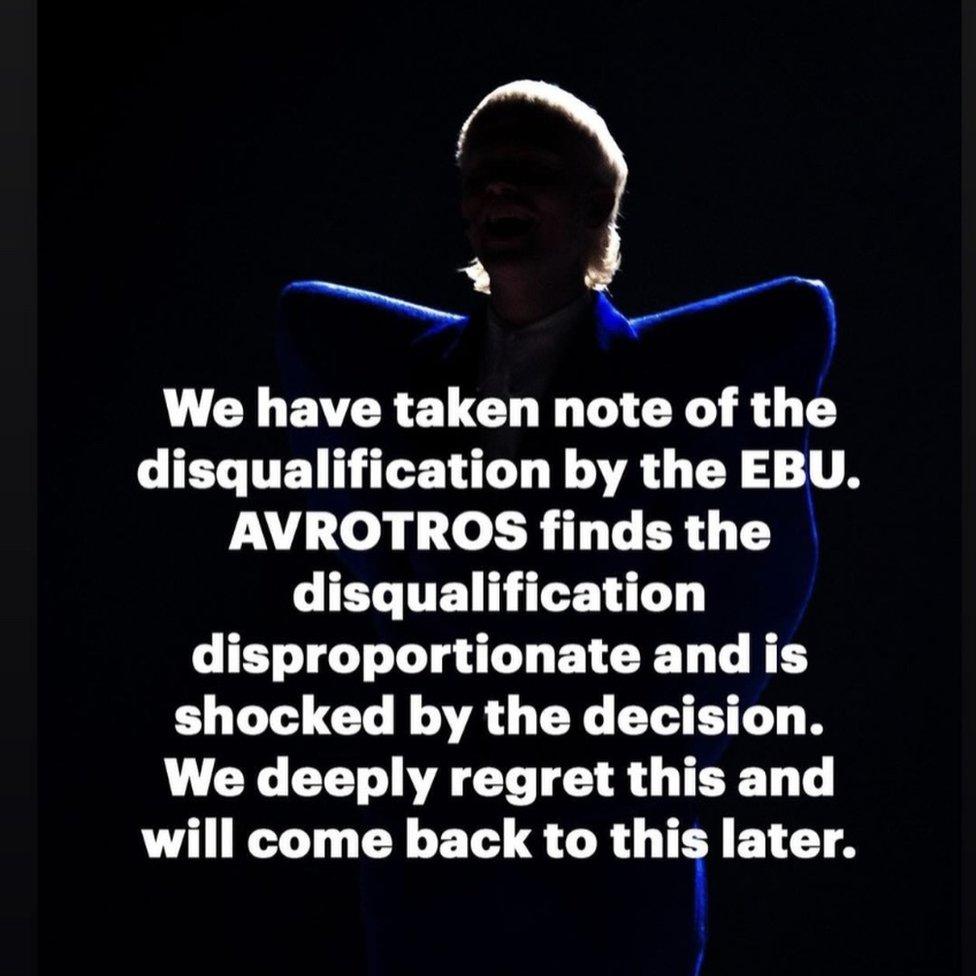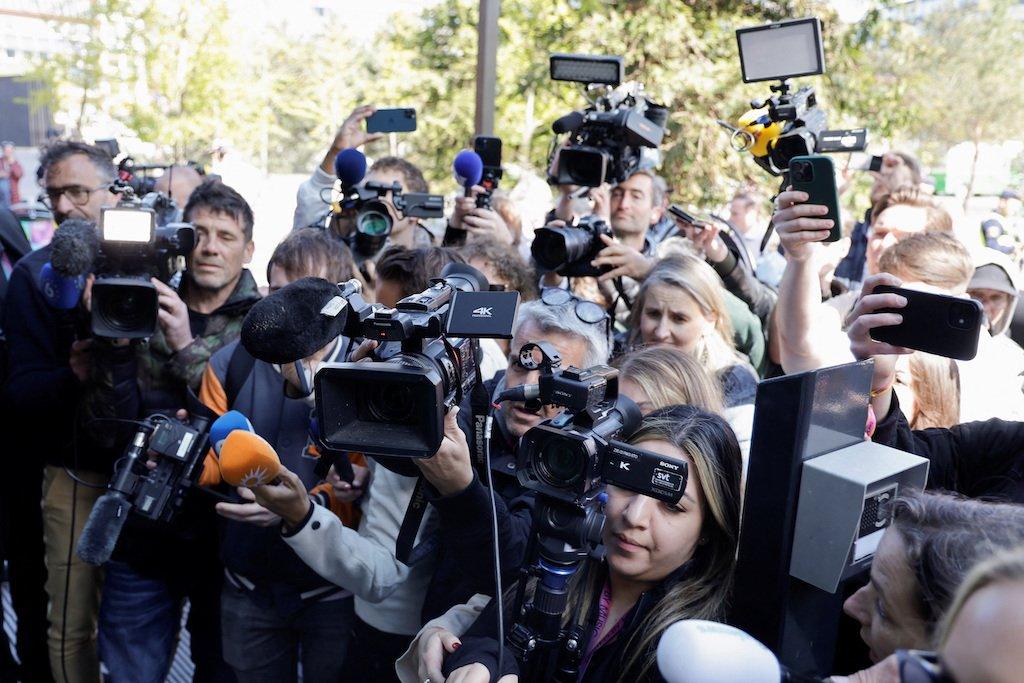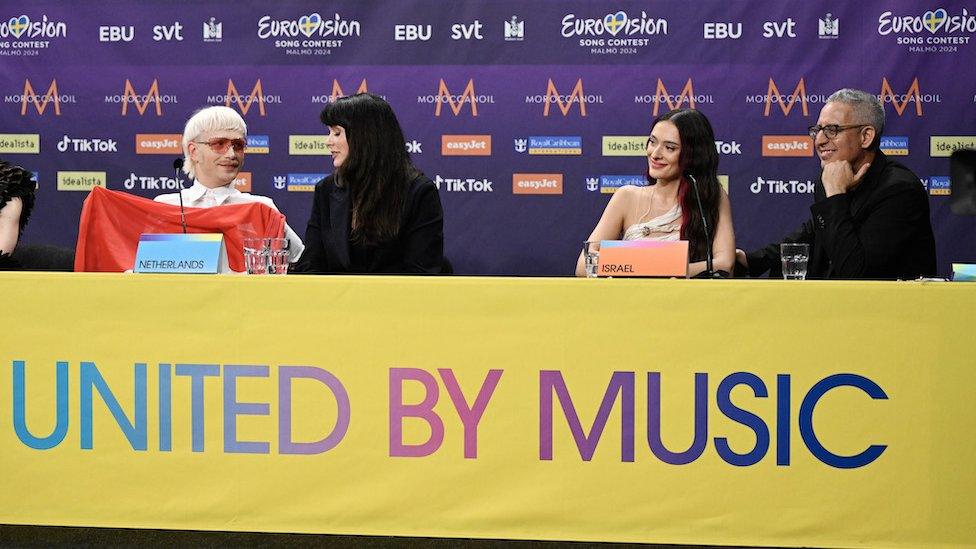Joost Klein: Dutch contestant disqualified from Eurovision Song Contest
- Published

The Dutch artist Joost Klein has been disqualified from the Eurovision Song Contest after a backstage incident.
An allegation of intimidation was made to Swedish police by a female member of the production crew.
The Netherlands Songfestival said Klein had "repeatedly indicated" he did not want to be filmed and that he "did not touch the camera woman".
Meanwhile, Ireland's entrant Bambie Thug missed their dress rehearsal, but hoped to be on stage for the show.
On their Instagram story, Bambie Thug explained that there had been a "situation" prior to the flag parade rehearsal "which I felt needed urgent attention" from the European Broadcasting Union (EBU).
Bambie Thug made no reference to Klein's exclusion and there is no suggestion the two incidents are related.
Separately, Norwegian media is reporting that their jury spokesman Allesandra Mele has pulled out, citing the "inflamed situation" in Malmo. She came fourth representing Norway last year with the song Queen of Kings.
Dutch broadcaster Avrotros called Klein's disqualification "disproportionate".
In a statement on social media, the company said it was "shocked by the decision" and would "come back to this later".
The contest organisers said "it would not be appropriate" for Klein to participate "while the legal process takes place".
Dutch broadcaster Avrotros, which sends acts to Eurovision, said: "Against clearly made agreements, Joost was filmed when he had just gotten off stage and had to rush to the greenroom. At that moment, Joost repeatedly indicated that he did not want to be filmed. This wasn't respected.
"This led to a threatening movement from Joost towards the camera. Joost did not touch the camerawoman."
The statement said the body had "consulted extensively" with the EBU and "proposed several solutions" but the decision was still taken to disqualify Klein.

Klein had been among the favourites to win this year's contest with his song, Europapa.
A pro-Europe techno anthem, it was dedicated to his father, who he lost to cancer aged 12.
Now 26, the singer had promised his father he would one day make it to the Eurovision stage.
News of his suspension emerged on Friday afternoon, during the first dress rehearsal for Saturday's televised grand final.
Klein's props were being set up on stage inside the Malmö Arena when a production manager indicated they should be removed.
His song was then skipped without explanation, and Israel's entrant Eden Golan, who was next in the running order, took his place.
The European Broadcasting Union (EBU), which organises the event, later issued a statement saying they were "investigating an incident that was reported to us involving the Dutch artist".
'Zero tolerance'
On Saturday, Swedish police confirmed that a man had been reported for making "unlawful threats" at Malmö Arena, after Thursday's semi-final.
"The police have taken all essential investigative measures and questioned the suspect, plaintiff and witnesses," a spokesperson said.
"The investigation has been completed by the police... and the case will now go to the prosecutor within a few weeks."
The EBU subsequently confirmed Klein would not be taking part in Saturday's grand final.
"We maintain a zero-tolerance policy towards inappropriate behaviour at our event and are committed to providing a safe and secure working environment for all staff at the Contest," they said.
"In light of this, Joost Klein's behaviour towards a team member is deemed in breach of Contest rules."
Although contestants have been disqualified from Eurovision in the past, none has ever lost their place this close to the final.
More commonly, songs are rejected at the selection stage. In 2021, the Belarusian entry was banned after refusing to change lyrics that the contest deemed to be political in nature; while in 2016, Romania was barred from participating due to outstanding debts owed to the EBU.

International media has gathered outside Klein's hotel in Malmo, Sweden
Swedish and Dutch news outlets have said that the incident involved Klein and a member of the television production team.
Organisers stressed that "contrary to some media reports and social media speculation, this incident did not involve any other performer or delegation member".
Early reports suggested there had been antagonism between Klein and Israel's contestant, as feelings run high over the Israel-Gaza war.
At a Eurovision press conference on Thursday, Golan was asked whether she had "ever thought that by being here you bring risk and danger for other participants and public?"
When the Israeli singer was told by the moderator that she did not have to answer the question, Klein chimed in: "Why not?"
Golan replied: "I think we're all here for one reason, and one reason only, and the EBU is taking all safety precautions to make this a safe and united place for everyone, and so I think it's safe for everyone and we wouldn't be here [if not]."
Earlier, when Klein was asked if his song could live up to the Eurovision slogan and unite people by music, he replied: "I think that's a good question for the EBU."

Klein (left) appeared at a press conference with Israel's contestant Eden Golan (second right) on Thursday night
Saturday's grand final will now progress with 25 acts, instead of the planned 26.
The event will begin at 21:00 local time (20:00 BST) and is schedule to end at midnight (23:00 BST).
Dutch viewers are still allowed to vote, and the Dutch jury result (which was decided during Friday's second dress rehearsal) is still valid.
It would not be possible for another act to replace Klein, partly because of the difficulty in adding new elements to the production at the last minute.
Organisers would also be unwilling to promote the eliminated, 11th-place contestant from Thursday's semi-final, as it would contravene rules on revealing the results of the public vote.
Related topics
- Published11 May 2024
- Published10 May 2024
- Published9 May 2024